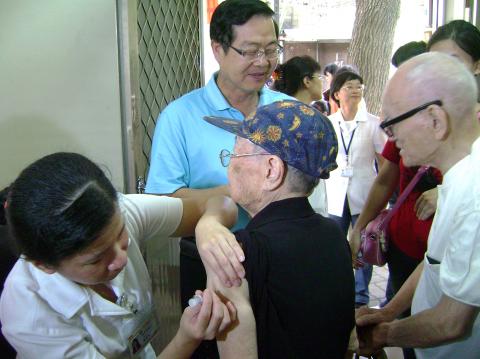Since the beginning of the flu season in July last year, 107 people in Taiwan have died from flu-related illnesses, Department of Health Minister Chiu Wen-ta (邱文達) told the legislature’s Social Welfare and Environmental Hygiene Committee yesterday.
Health officials said the number of people affected with seasonal influenza was expected to drop this month and next as temperatures climb.
Of those who died from the flu, more than 70 were infected with A(H1N1), commonly known as swine flu, the department said.

Photo: Chen Feng-li, Taipei Times
People above the age of 65 had the highest fatality rate from the flu, health officials said.
The department said people in the high-risk group, such as young children and the elderly, as well as people with chronic diseases, were more prone to develop complications and severe symptoms from the flu. People who fall into these categories are strongly advised to receive flu shots if they have not already done so.
“I recently surveyed hospitals in various parts of the country and found that numbers of emergency visits to the hospital [from flu-like symptoms] have dropped,” Chiu said.
However, the health minister said he would still instruct local health authorities to remain alert and avoid being complacent about flu conditions.
The department said a majority of those who died from flu had not been vaccinated against seasonal flu viruses, adding that receiving flu shots was the most effective measure against the disease.
The Centers for Disease Control said that according to the WHO, the next flu season is expected to be dominated by the A(H1N1) virus and other strains similar to those from this season.
Although people who have already been infected develop immunity within two to three weeks, they are nevertheless advised to rest and drink plenty of water to help rebuild their immune system.

The Coast Guard Administration (CGA) and Chunghwa Telecom yesterday confirmed that an international undersea cable near Keelung Harbor had been cut by a Chinese ship, the Shunxin-39, a freighter registered in Cameroon. Chunghwa Telecom said the cable had its own backup equipment, and the incident would not affect telecommunications within Taiwan. The CGA said it dispatched a ship under its first fleet after receiving word of the incident and located the Shunxin-39 7 nautical miles (13km) north of Yehliu (野柳) at about 4:40pm on Friday. The CGA demanded that the Shunxin-39 return to seas closer to Keelung Harbor for investigation over the

National Kaohsiung University of Science and Technology (NKUST) yesterday promised it would increase oversight of use of Chinese in course materials, following a social media outcry over instances of simplified Chinese characters being used, including in a final exam. People on Threads wrote that simplified Chinese characters were used on a final exam and in a textbook for a translation course at the university, while the business card of a professor bore the words: “Taiwan Province, China.” Photographs of the exam, the textbook and the business card were posted with the comments. NKUST said that other members of the faculty did not see

The Taipei City Government yesterday said contractors organizing its New Year’s Eve celebrations would be held responsible after a jumbo screen played a Beijing-ran television channel near the event’s end. An image showing China Central Television (CCTV) Channel 3 being displayed was posted on the social media platform Threads, sparking an outcry on the Internet over Beijing’s alleged political infiltration of the municipal government. A Taipei Department of Information and Tourism spokesman said event workers had made a “grave mistake” and that the Television Broadcasts Satellite (TVBS) group had the contract to operate the screens. The city would apply contractual penalties on TVBS

An apartment building in New Taipei City’s Sanchong District (三重) collapsed last night after a nearby construction project earlier in the day allegedly caused it to tilt. Shortly after work began at 9am on an ongoing excavation of a construction site on Liuzhang Street (六張街), two neighboring apartment buildings tilted and cracked, leading to exterior tiles peeling off, city officials said. The fire department then dispatched personnel to help evacuate 22 residents from nine households. After the incident, the city government first filled the building at No. 190, which appeared to be more badly affected, with water to stabilize the